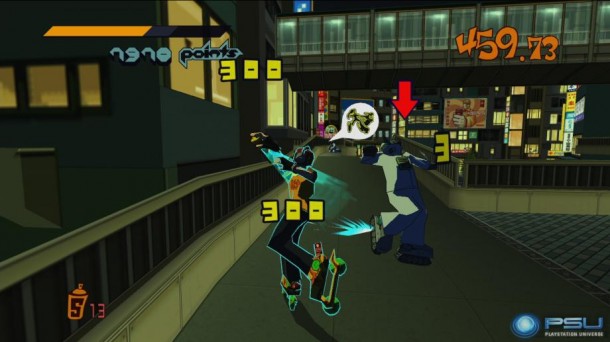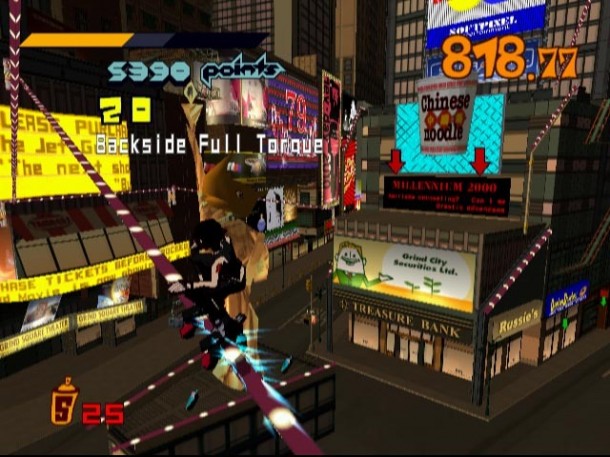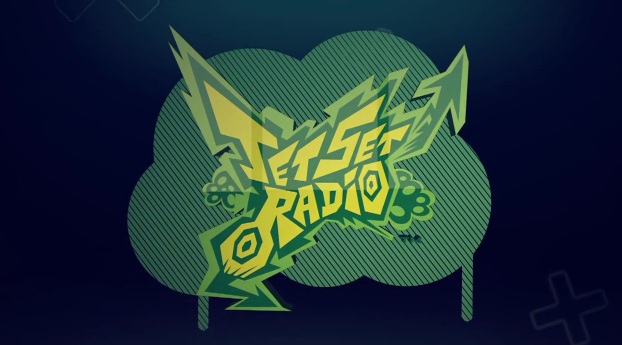
Jet Set Radio was a glittering orb of hope on the Dreamcast’s half-dead shell. On a console full of ludicrously Japanese experiences — during a time when releasing such things in America was becoming increasingly unthinkable from a business standpoint — Jet Set Radio was one of the most ludicrous. Now, it’s returned to a world where the ridiculous is more than just celebrated; it’s profitable. So just how well do these jets grind in this brave, new world?
As it turns out, they’re not as well set as I’d hoped.
First and foremost, let’s get the nostalgia out of the way. Jet Set Radio was a truly unique product when it was first released. It didn’t look or sound quite like anything else on the market, thanks in large part to its cel-shaded graphics and quintessentially new millennium soundtrack.
Thankfully, those components still stand up remarkably well on their own. With some remakes, flaws in a game’s visuals that were hidden by lower resolutions can be made often more apparent by their leap in fidelity. The game’s cell-shaded graphics make the jump to HD with remarkable clarity, thanks to their flat, even colors and broad outlines. Not only that, but with all of the extra RAM to play with, the developers have extended the game’s draw distances considerably, allowing you to actually see these improvements as they display in widescreen for the first time.
This isn’t what Jet Set Radio used to look like, this is what your childhood remembers Jet Set Radio looking like.

The soundtrack fares just as well. Granted, much of your appreciation for the game’s music will depend on personal taste, nostalgia and how much you miss the solitary track that Sega wasn’t able to bring back. Regardless of that, the aggressive tunes match the visual style and mood of the game perfectly.
Together, the music and graphics perfectly crystalize an optimistic vision of an angry youth culture unable to focus their angst on anyone or anything in particular, much like they originally did in 2000. That culture that had turned to new and alternative forms of expression like graffiti and perhaps even playing quirky, foreign video games was the perfect audience for Jet Set Radio at the turn of the century.
Unfortunately, the average tolerance for the quirky in the video game community isn’t what it was twelve years ago. The oddness that endeared Jet Set Radio to so many people simply isn’t as unique in a world where something like No More Heroes can not only be brought to the States, but get a sequel.
It’s not that the Jet Set Radio aesthetic hasn’t aged well, it’s just that it has been surpassed in the years since its original release. The Japanese idiosyncrasies that were a rarity in the Dreamcast era now provide for acceptable marketing strategies in our irony-driven subculture. In a way, Jet Set Radio’s uniqueness has been a victim of the very establishment it was so agitated with.
But the most damning result of the game’s age is that it’s just not very fun to play anymore.
Jet Set Radio is hard. Frustratingly hard. The most basic acts of maneuvering across the environment – things as simple as jumping from point to point – feel as though they require either pinpoint precision on the part of the player, or dumb luck in order to execute properly. Neither possibility is particularly comforting when you’ve missed a simple grind rail by millimeters for the fourth time in a stage is running out.
It can still be fun and exciting to prioritize the more difficult to reach targets, knowing that every second that passes brings you closer to the inevitable police blitzkrieg. The remake’s updated camera also helps to alleviate at least one egregiously aggravating aspect. However, it’s almost never fun or simple to get your character to just do what the buttons are supposed to make them do. And when you get right down to it, the final payoff upon reaching a difficult tag target is just a series of quick-time events. That sort of design was perhaps more acceptable in a time when developers hadn’t realized that it should be easy to do something cool in trick-based platformers, a la Tony Hawk’s Pro Skater, but not in 2012.
The battered brick beneath Jet Set Radio’s stunning new paint job just can’t support the level of fun that it should. The foundation you’re left with is an often frustrating, offbeat action-platformer that looks great and sounds even better. There are certainly worse things you could buy with ten bucks than a piece of revised history, but there are stronger ones, too.
This review is based on a copy of the game provided to SideQuesting by the publisher. It was played on a Playstation 3.



No Comments